Doctrina Communis
A public heretic cannot retain the papacy
List of most known authorities
The number and the weight of the theological authorities support the contention that a validly elected pope who committed a public and notorious act of heresy would automatically cease to be pope. The authors tell us that it is the “most common” teaching of the canonists and theologians or that they “commonly teach” it. Moreover, three doctors of the Church have taught it, none have taught contrary; the canonized theologians are unanimous; Saint Robert Bellarmine, Doctor of the Church, wrote that “this is the teaching of ALL the ancient Fathers”.
Important catholic principle :
When a teaching has been learned “everywhere, always and by everyone”, is belongs to the Revelation and is infallible. This principle was of all Church Fathers. You can read about this the Commonitorium of St Vincent de Lerins.
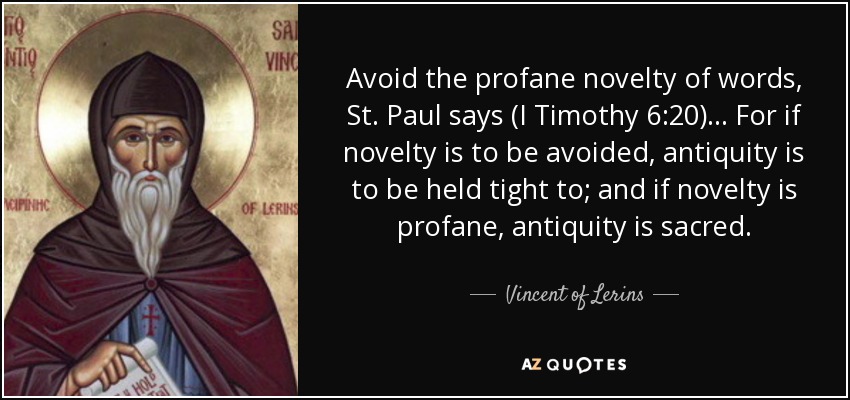
The Decretum Gratiani, also known as the Concordia discordantium canonum or Concordantia discordantium canonum or simply as the Decretum, is a collection of Canon law compiled and written in the 12th century as a legal textbook by the jurist known as Gratian. It forms the first part of the collection of six legal texts, which together became known as the Corpus Juris Canonici. It was used by canonists of the Roman Catholic Church until Pentecost (May 19) 1918, when a revised Code of Canon Law (Codex Iuris Canonici) promulgated by Pope Benedict XV on 27 May 1917 obtained legal force.
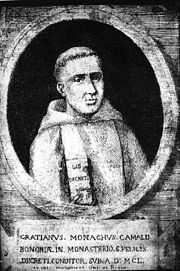
Gratianus
In the Decretum, jurist Gratian wrote a principle that was held “everywhere, always and by everybody” in the Church, hence it is an infallible Doctrine of the Tradition :
“Summa sedes a nemine iudicetur, NISI a fide devius inveniatur” :
“the Highest See cannot be judged by anyone,
unless he has been found deviating from the faith”
Jurist Raoul Naz states that it is not “judging” in strict sense but in the large sense: the Church (sain part of the teaching Church, the bishops who are not heretic) will not judge properly but the Church can note that a pope has deviated from the faith and by this fact IS fallen from the See.
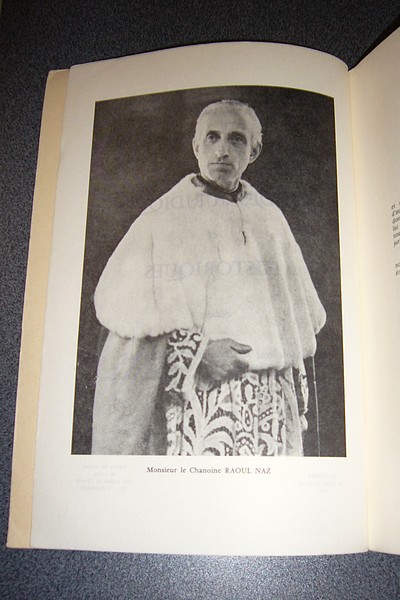
Prof. Dr.Dr. Raoul NAZ
So stated a pope : Papa INNOCENTIUS III (CA. 1160-1216):
“The pope should not flatter himself about his power, nor should he rashly glory in his honor and high estate, because the less he is judged by man, the more he is judged by God. Still the less can the Roman Pontiff glory, because he can be judged by men, or rather, can be shown to be already judged, if for example he should wither away into heresy, because he who does not believe is already judged. In such a case it should be said of him:
‘If salt should lose its savor, it is good for nothing but to be cast out and trampled under foot by men.’” (Sermo 4)
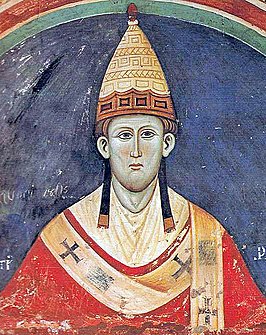
Innocentius III
Others:
We shall first see the teaching of the Doctors of the Church, whose writings the Church directs us to in a special way as theological teachers.
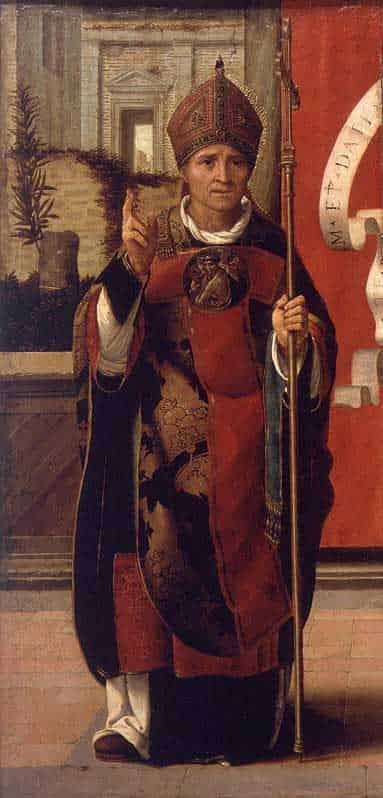
Saint Antoninus (1389-1459):
“In the case in which the pope would become a heretic, he would find himself, by that fact alone and without any other sentence, separated from the Church. A head separated from a body cannot, as long as it remains separated, be head of the same body from which it was cut off. A pope who would be separated from the Church by heresy, therefore, would by that very fact itself cease to be head of the Church. He could not be a heretic and remain pope, because, since he is outside of the Church, he cannot possess the keys of the Church.” (Summa Theologica. Quoted in Actes de Vatican I)
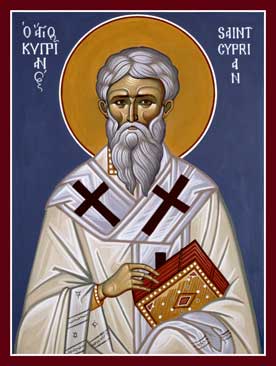
St Cyprian
Saint Cyprian, Saint Athanasius (Scr. 2 cont. Arian.), Saint Augustine and Saint Jerome :
See : St Robert Bellarmine, On the Roman Pontiff, Book 2, Chapter 30.
“This principle is most certain. The non-Christian cannot in any way be Pope, as Cajetan himself admits (ib. c. 26). The reason for this is that he cannot be head of what he is not a member; now he who is not a Christian is not a member of the Church, and a manifest heretic is not a Christian, as is clearly taught by St. Cyprian (lib. 4, epist. 2), St. Athanasius (Scr. 2 cont. Arian.), St. Augustine (lib. de great. Christ. cap. 20), St. Jerome (contra Lucifer.) and others; therefore the manifest heretic cannot be Pope.”
Saint Robert Bellarmine, Doctor (1542-1621): “Therefore, the true opinion is the fifth, according to which the Pope who is manifestly a heretic ceases by himself to be Pope and head, in the same way as he ceases to be a Christian and a member of the body of the Church; and for this reason he can be judged and punished by the Church.
This is the opinion of all the ancient Fathers, who teach that manifest heretics immediately lose all jurisdiction, and outstandingly that of St. Cyprian (lib. 4, epist. 2) who speaks as follows of Novatian, who was Pope [i.e. antipope] in the schism which occurred during the pontificate of St. Cornelius: ‘He would not be able to retain the episcopate [i.e. of Rome], and, if he was made bishop before, he separated himself from the body of those who were, like him, bishops, and from the unity of the Church.’ According to what St. Cyprian affirms in this passage, even had Novatian been the true and legitimate Pope, he would have automatically fallen from the pontificate, if he separated himself from the Church.
“This is the opinion of great recent doctors, as John Driedo (lib. 4 de Script. et dogmat. Eccles., cap. 2, par. 2, sent. 2), who teaches that only they separate themselves from the Church who are expelled, like the excommunicated, and those who depart by themselves from her or oppose her, as heretics and schismatics. And in his seventh affirmation, he maintains that in those who turn away from the Church, there remains absolutely no spiritual power over those who are in the Church.
Melchior Cano says the same (lib. 4 de loc., cap. 2), teaching that heretics are neither parts nor members of the Church, and that it cannot even be conceived that anyone could be head and Pope, without being member and part (cap. ult. ad argument. 12). And he teaches in the same place, in plain words, that occult heretics are still of the Church, they are parts and members, and that therefore the Pope who is an occult heretic is still Pope. This is also the opinion of the other authors whom we cite in book I De Ecclesia.
“The foundation of this argument is that the manifest heretic is not in any way a member of the Church, that is, neither spiritually nor corporally, which signifies that he is not such by internal union nor by external union. For even bad Catholics [i.e. who are not heretics] are united and are members, spiritually by faith, corporally by confession of faith and by participation in the visible sacraments; the occult heretics are united and are members although only by external union; on the contrary, the good catechumens belong to the Church only by an internal union, not by the external; but manifest heretics do not pertain in any manner, as we have already proved.” (De Romano Pontifice, lib. II, cap. 30)
THE CATHOLIC ENCYCLOPEDIA (1907)
“It has been a common teaching of theologians that a validly elected pope can fall into heresy and so vacate the See of Peter by automatic tacit resignation.” (Vol. VII, p. 261)
“Were a Pope to become a public heretic, where he clearly opposed what has been defined as de fide Catholicism, many theologians hold that no formal sentence of disposition would be required, as by becoming a public heretic the Pope would ipso facto cease to be pope.”
GIACOMO TOMMASO DE VIO GAETANI CAJETAN, O.P. (1469-1534), THEOLOGIAN AND CARDINAL
Cardinal Cajetan points out that the famous axiom “Ubi Petrus, ibis Ecclesia” [Where the Pope is, there is also the Church] holds true only when the Pope acts and behaves as the Pope, because Peter “is subject to the duties of the Office”; otherwise, “neither is the Church in him, nor is he in the Church.” (Apud St. Thomas Aquinas, Summa Theologica, IIa IIae, Q. 39, Art. 1, ad 6)
Cajetanus about a pope who destroys the church what happens if the Sovereign Pontiff “subverts all ecclesiastical ceremonies,” “disobeys the law of Christ,” “orders what is contrary to natural or divine law,” “fails to observe what was universally ordered by the universal councils or by the authority of the Apostolic See, above all regarding divine worship,” “fails to observe the universal rite of ecclesiastic worship,” “pertinaciously fails to respect what was established for the common order of the Church,” thus making it possible and eventually obligatory by conscience “to resist him to his face.” Cardinal Cajetanus even says that in such a case “neither the Church would be in him, nor he in the Church” (II – II, q. 39, a. 1, n. VI).

Saint Frances de Sales, Doctor (1567-1622):
“Now when [the Pope] is explicitly a heretic, he falls ipso facto from his dignity and out of the Church.” (The Catholic Controversy)

Saint Alphonsus Maria Liguori, Doctor (1696-1787): “If, however, God were to permit a pope to become a notorious and contumacious heretic, he would by such a fact cease to be pope, and the apostolic chair would be vacant.” (Verita della Fede, III, VIII. 9-10)
Moreover, St. Bellarmine indicated that the ancient Fathers based their arguments not on any ecclesiastical law but taught that heretics lose any Church office, including the papacy, by the unalterable divine law because of the very nature of heresy.
“There is no basis for that which some respond to this: that these Fathers based themselves on ancient law, while nowadays, by decree of the Council of Constance, they alone lose their jurisdiction who are excommunicated by name or who assault clerics. This argument, I say, has no value at all, for those Fathers, in affirming that heretics lose jurisdiction, did not cite any human law, which furthermore perhaps did not exist in relation to the matter, but argued on the basis of the very nature of heresy. The Council of Constance only deals with the excommunicated, that is, those who have lost jurisdiction by sentence of the Church, while heretics already before being excommunicated are outside the Church and deprived of all jurisdiction. For they have already been condemned by their own sentence, as the Apostle teaches (Tit. 3:10-11), that is, they have been cut off from the body of the Church without excommunication, as St. Jerome affirms.” (De Romano Pontifice, lib. II, cap. 30)
Bishop Josef Fessler, who was professor of canon law at the University of Vienna from 1856 to 1861 and was Secretary-General of the Vatican Council of 1870, discussed Cum Ex Apostolatus in a work that was honoured by a brief of approbation by Pius IX after it had been submitted to a committee of cardinals to examine its orthodoxy. Fessler discussed a case where a purported pope would attempt to impose heresy upon the faithful and pointed out that the election of such a man would be nullified.
“If, then, as has been suggested, a man were elected Pope who might uphold heretical doctrine to the whole Church formally as Catholic doctrine de fide, or prescribe it to be held as such, then we should have the case before us for which Pope Paul IV, in the above-named Bull provides, by quashing the election of such a man to the Papacy, and declaring it ‘null and void.’” (The True and False Infallibility of the Popes, Burns and Oats, London, 1875)
Archbishop Purcell, of Cincinnati, Ohio gave an address at the same Vatican Council, on the infallibility of the Pope as defined at the Council; he explained as follows.
“The question was also raised by a Cardinal, ‘What is to be done with the Pope if he becomes a heretic?’ It was answered that there has never been such a case; the Council of Bishops could depose him for heresy, for from the moment he becomes a heretic he is not the head or even a member of the Church. The Church would not be, for a moment, obliged to listen to him when he begins to teach a doctrine the Church knows to be a false doctrine, and he would cease to be Pope, being deposed by God Himself.
“If the Pope, for instance, were to say that the belief in God is false, you would not be obliged to believe him, or if he were to deny the rest of the creed, ‘I believe in Christ,’ etc. The supposition is injurious to the Holy Father in the very idea, but serves to show you the fullness with which the subject has been considered and the ample thought given to every possibility. If he denies any dogma of the Church held by every true believer, he is no more Pope than either you or I; and so in this respect the dogma of infallibility amounts to nothing as an article of temporal government or cover for heresy.”

Cardinal Billot (1846-1931):
“Once the hypothesis that a Pope can become a known and public heretic is conceded as a possibility, it would follow that it must be admitted without hesitation that such a Pope would ipso facto lose his papal authority since, in betraying the faith, he would by his own will, have separated himself from the body of the Church.”
HUGGUCIO of PISA (+ 1210)
Huggucio of Pisa He wrote a “Summa Decretorum” on the Decretum of Gratian, the most extensive and perhaps the most authoritative commentary of that time.
“A pope who indeed a fornicator in public and has a concubine in public [ecce publico fornicator publico habet concubinem] can indeed be deposed because to scandalize the Church is in itself heresy.”
GIROLAMO SAVONAROLA (1452-1498)
DOMINICAN PREACHER (CAUSE FOR CANONIZATION PENDING)
The Lord, moved to anger by this intolerable corruption, has, for some time past, allowed the Church to be without a pastor. For I bear witness in the name of God that this Alexander VI is in no way Pope and cannot be…. This I declare in the first place and affirm it with all certitude, that the man is not a Christian; he does not even believe any longer that there is a God; he goes beyond the final limits of infidelity and impiety.” (Letter to the Emperor)

Papa INNOCENTIUS III (CA. 1160-1216):
“The pope should not flatter himself about his power, nor should he rashly glory in his honor and high estate, because the less he is judged by man, the more he is judged by God. Still the less can the Roman Pontiff glory, because he can be judged by men, or rather, can be shown to be already judged, if for example he should wither away into heresy, because he who does not believe is already judged. In such a case it should be said of him:
‘If salt should lose its savor, it is good for nothing but to be cast out and trampled under foot by men.'” (Sermo 4)
See:
Matthaeus Conte a Coronata: “2. Loss of office of the Roman Pontiff. This can occur in various ways: […] c) Notorious heresy. Certain authors deny the supposition that the Roman Pontiff can become a heretic. It cannot be proven however that the Roman Pontiff, as a private teacher, cannot become a heretic – if, for example, he would contumaciously deny a previously defined dogma. Such impeccability was never promised by God. Indeed, Pope Innocent III expressly admits such a case is possible. If indeed such a situation would happen, he would, by divine law, fall from office without any sentence, indeed, without even a declaratory one. He who openly professes heresy places himself outside the Church, and it is not likely that Christ would preserve the Primacy of His Church in one so unworthy. Wherefore, if the Roman Pontiff were to profess heresy, before any condemnatory sentence (which would be impossible anyway) he would lose his authority.” (Institutiones Iuris Canonici. Rome: Marietti 1950. I:3I2, 3I6)
Pope Innocentius III
J. Wilhelm: “The pope himself, if notoriously guilty of heresy, would cease to be pope because he would cease to be a member of the Church.”(Heresy, 1914 Catholic Encyclopedia)
“For a heretical pope has ceased to be a member of the Church, and cannot, therefore, be its head.” (General Councils, 1914 Catholic Encyclopedia)
Code of Canon Law of 1917. Canon 188: “Through tacit resignation, accepted by the law itself, all offices become vacant ipso facto and without any declaration if a cleric: … #4) has publicly forsaken the Catholic faith.”
Caesar Badii: “Cessation of pontifical power. This power ceases: […] (d) Through notorious and openly divulged heresy. A publicly heretical pope would no longer be a member of the Church; for this reason, he could no longer be its head.” (Institutiones Iuris Canonici. Florence: Fiorentina 1921. 160, 165)
Dominic Prummer: “The power of the Roman Pontiff is lost. […] (c) By his perpetual insanity or by formal heresy. And this at least probably. […] The Authors indeed commonly teach that a pope loses his power through certain and notorious heresy, but whether this case is really possible is rightly doubted.” (Manuale Iuris Canonci. Freiburg im Briesgau: Herder 1927. 95)
F.X. Wernz, P. Vidal: “Finally, there is the fifth opinion – that of Bellarmine himself – which was expressed initially and is rightly defended by Tanner and others as the best proven and the most common. For he who is no longer a member of the body of the Church, i.e. the Church as a visible society, cannot be the head of the Universal Church. But a Pope who fell into public heresy would cease by that very fact to be a member of the Church. Therefore he would also cease by that very fact to be the head of the Church. Indeed, a publicly heretical Pope, who, by the commandment of Christ and the Apostle must even be avoided because of the danger to the Church, must be deprived of his power as almost all admit.” (Ius Canonicum. Rome: Gregorian 1943. 2:453)
Udalricus Beste: “Not a few canonists teach that, outside of death and abdication, the pontifical dignity can also be lost by falling into certain insanity, which is legally equivalent to death, as well as through manifest and notorious heresy. In the latter case, a pope would automatically fall from his power, and this indeed without the issuance of any sentence, for the first See is judged by no one. The reason is that, by falling into heresy, the pope ceases to be a member of the Church. He who is not a member of a society, obviously cannot be its head.” (Introductio in Codicem. 3rd ed. Collegeville: St John’s Abbey Press 1946. Canon 221)
A. Vermeersch, I. Creusen: “The power of the Roman Pontiff ceases by death, free resignation (which is valid without need for any acceptance, c.221), certain and unquestionably perpetual insanity and notorious heresy. At least according to the more common teaching, the Roman Pontiff as a private teacher can fall into manifest heresy. Then, without any declaratory sentence (for the supreme See is judged by no one), he would automatically fall from a power which he who is no longer a member of the Church is unable to possess.” (Epitome Iuris Canonici. Rome: Dessain 1949. 340)
Matthaeus Conte a Coronata: “2. Loss of office of the Roman Pontiff. This can occur in various ways: […] c) Notorious heresy. Certain authors deny the supposition that the Roman Pontiff can become a heretic. It cannot be proven however that the Roman Pontiff, as a private teacher, cannot become a heretic – if, for example, he would contumaciously deny a previously defined dogma. Such impeccability was never promised by God. Indeed, Pope Innocent III expressly admits such a case is possible. If indeed such a situation would happen, he would, by divine law, fall from office without any sentence, indeed, without even a declaratory one. He who openly professes heresy places himself outside the Church, and it is not likely that Christ would preserve the Primacy of His Church in one so unworthy. Wherefore, if the Roman Pontiff were to profess heresy, before any condemnatory sentence (which would be impossible anyway) he would lose his authority.” (Institutiones Iuris Canonici. Rome: Marietti 1950. I:3I2, 3I6)
Donald Attwater: “A pope can only be deposed for heresy, expressed or implied, and then only by a general council. It is not strictly deposition, but a declaration of fact, since by his heresy he has already ceased to be head of the Church. […] An heretical pope necessarily ceases to be head of the Church, for by his heresy he is no longer a member thereof: in the event of his still claiming the Roman see a general council, improperly so-called because without the pope, could remove him. But this is not deposition, since by his own act he is no longer pope.” (A Catholic Dictionary 1951)
Nah Raoul : “It is enough that a pope teaches heresy as a private doctor to lose, without any sanction, his supreme office.” (Dictionnaire du Droit Canonique, Paris: 1953, VII, 27)
Eduardus F. Regatillo: “The Roman Pontiff ceases in office: […] (4) Through notorious public heresy? Five answers have been given: 1. ‘The pope cannot be a heretic even as a private teacher.’ A pious thought, but essentially unfounded. 2. ‘The pope loses office even through secret heresy.’ False, because a secret heretic can be a member of the Church. 3. ‘The pope does not lose office because of public heresy.’ Objectionable. 4. ‘The pope loses office by a judicial sentence because of public heresy.’ But who would issue the sentence? The See of Peter is judged by no one (Canon 1556). 5. ‘The pope loses office ipso facto because of public heresy.’ This is the more common teaching, because a pope would not be a member of the Church, and hence far less could be its head.” (Institutiones Iuris Canonici. 5th ed. Santander: Sal Terrae, 1956. 1:396)
FR HENRY IGNATIUS DUDLEY RYDER (1837-1907)
THEOLOGIAN AND SUPERIOR OF THE BIRMINGHAM ORATORY SUCCESSOR AND STUDENT OF JOHN HENRY CARDINAL NEWMAN
“It has always been maintained by Catholic theologians that for heresy the Church may judge the Pope, because, as most maintain, by heresy he ceases to be Pope.
There is no variance on this head amongst theologians that I know of, except that some, with Turrecremata and Bellarmine, hold that by heresy he ipso facto ceases to be Pope: whilst others, with Cajetan and John of St. Thomas, maintain that he would not formally [as opposed to materially] cease to be Pope until he was formally deposed.
“The privilege of infallible teaching belongs only to an undoubted Pope; and on the claims of a doubtful, disputed Pope the Church has the right of judging. No single example can be produced of a Pope whose orthodoxy and succession ws undoubted upon whom the Church pretended to sit in judgment…. During a contested Papacy the state of things approximates to that of an interregnum. The exercise of active infallability is suspended.” (Catholic Controversy, 6th ed., Burns & Oates, pp. 30-31)
Papa Sanctus AGATHO (678-681)
“Papal Coronation Oath”, to be taken by all Roman pontiffs, showing that no Roman pontiff has the authority to contradict the Deposit of Faith, or to change or innovate upon what has been handed by to him by Sacred Tradition and his predecessors:
“I vow to change nothing of the received Tradition, and nothing thereof I have found before me guarded by my God-pleasing predecessors, to encroach upon, to alter, or to permit any innovation therein;
“To the contrary: with glowing affection as her truly faithful student and successor, to safeguard reverently the passed-on good, with my whole strength and utmost effort;
“To cleanse all that is in contradiction to the canonical order, should such appear;
“To guard the Holy Canons and Decrees of our Popes as if they were the Divine ordinances of Heaven, because I am conscious of Thee, whose place I take through the Grace of God, whose Vicarship I possess with Thy support, being subject to the severest accounting before Thy Divine Tribunal over all that I shall confess;
“I swear to God Almighty and the Savior Jesus Christ that I will keep whatever has been revealed through Christ and His Successors and whatever the first councils and my predecessors have defined and declared.
“I will keep without sacrifice to itself the discipline and the rite of the Church. I will put outside the Church whoever dares to go against this oath, may it be somebody else or I.
“If I should undertake to act in anything of contrary sense, or should permit that it will be executed, Thou willst not be merciful to me on the dreadful Day of Divine Justice.
“Accordingly, without exclusion, We subject to severest excommunication anyone — be it ourselves or be it another — who would dare to undertake anything new in contradiction to this constituted evangelic Tradition and the purity of the Orthodox Faith and the Christian Religion, or would seek to change anything by his opposing efforts, or would agree with those who undertake such a blasphemous venture.”
(Liber Diurnus Romanorum Pontificum, Patrologia Latina 1005, S. 54)
Serapius Iragui: “For this reason, theologians commonly concede that the Roman Pontiff, if he should fall into manifest heresy, would no longer be a member of the Church, and therefore could neither be called its visible head.” (Manuale Theologiae Dogmaticae. Madrid: Ediciones Studium 1959)
Canonists on notoriety of papal heresy
We have seen the canonists state that heresy would have to be notorious to effect a loss of office. It would be public only if notorious. We cite the canonists quoted by Fr. Cekada in his booklet “Traditionalists, Infallibility and the Pope” (1995).
Wilhelm: “The pope himself, if notoriously guilty of heresy, would cease to be pope because he would cease to be a member of the Church.” (1907 Catholic Encyclopedia (1913))
Caesar Badii: “Cessation of pontifical power. This power ceases: […] (d) Through notorious and openly divulged heresy. A publicly heretical pope would no longer be a member of the Church; for this reason, he could no longer be its head.” (Institutiones Iuris Canonici (1921))
Dominic Prummer: “The power of the Roman Pontiff is lost: […] (c) By his perpetual insanity or by formal heresy. And this at least probably. […] The authors indeed commonly teach that a pope loses his power through certain and notorious heresy, but whether this case is really possible is rightly doubted.” (Manuale Iuris Canonici (1927))
Wernz-Vidal’s: “Through notorious and openly divulged heresy, the Roman Pontiff, should he fall into heresy, by that very fact [ipso facto] is deemed to be deprived of the power of jurisdiction even before any declaratory judgement by the Church. […] A pope who falls into public heresy would cease ipso facto to be a member of the Church; therefore, he would also cease to be head of the Church.” (Ius Canonicum (1943))
Udalricus Beste: “Not a few canonists teach that, outside of death and abdication, the pontifical dignity can also be lost by falling into certain insanity, which is legally equivalent to death, as well as through manifest and notorious heresy. In the latter case, a pope would automatically fall from his power, and this indeed without the issuance of any sentence, for the first See [i.e. the See of Peter] is judged by no one.” (Introductio in Codicem (1946))
Vermeersch, I. Creusen: “The power of the Roman Pontiff ceases by death, free resignation (which is valid without need for any acceptance, c.221), certain and unquestionably perpetual insanity and notorious heresy. At least according to the more common teaching, the Roman Pontiff as a private teacher can fall into manifest heresy. Then, without any declaratory sentence (for the supreme See is judged by no one), he would automatically [ipso facto] fall from a power which he who is no longer a member of the Church is unable to possess.” (Epitome Iuris Canonici (1949))
Matthaeus Conte a Coronata: “Loss of office of the Roman Pontiff. This can occur in various ways: […] c) Notorious heresy.” (Institutiones Iuris Canonici (1950))
Eduardus F. Regatillo: “The Roman Pontiff ceases in office: […] (4) Through notorious public heresy? Five answers have been given: […] 5. ‘The pope loses office ipso facto because of public heresy.’ This is the more common teaching, because a pope would not be a member of the Church, and hence far less could be its head.” (Institutiones Iuris Canonici (1956))
We may also note that the doctor St. Alphonsus Maria Liguori († 1787) also taught that papal heresy would have to be “notorious” before a loss occurred.
“If, however, God were to permit a pope to become a notorious and contumacious heretic, he would by such a fact cease to be pope, and the apostolic chair would be vacant.” (Verita della Fede)
